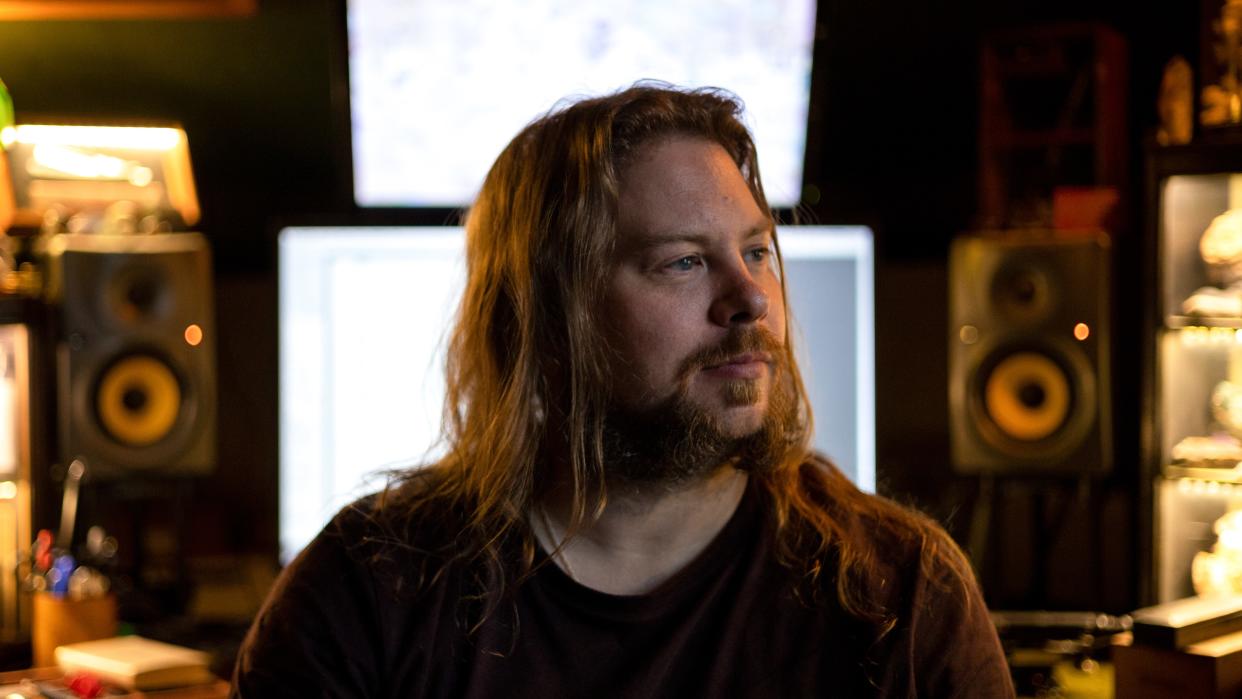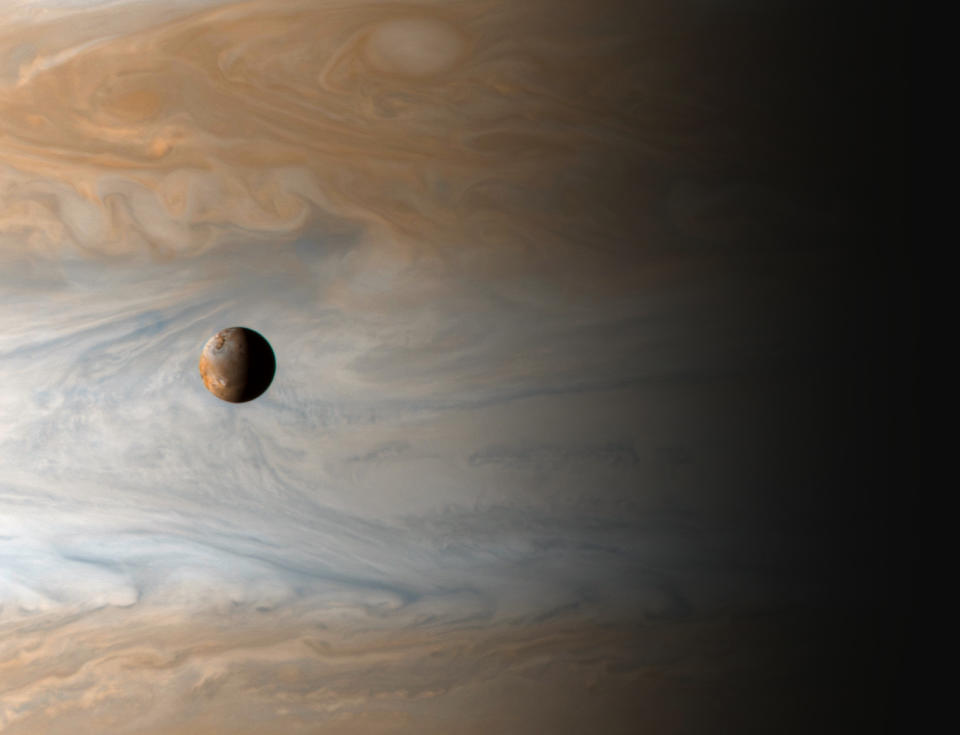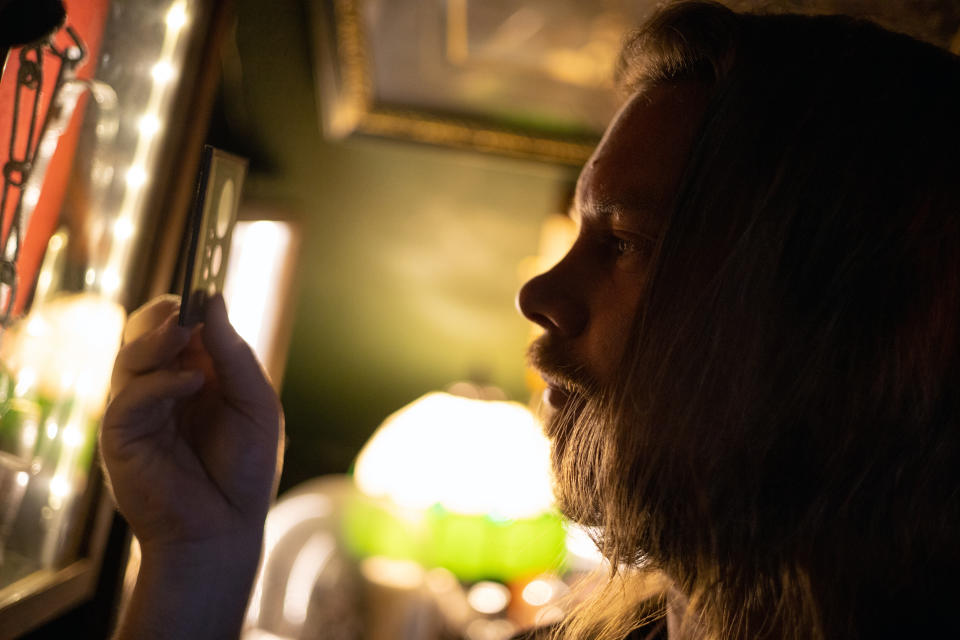Meet the maestro behind 'The Galilean Suite' — an epic space symphony dedicated to Jupiter's largest moons

- Oops!Something went wrong.Please try again later.
KNARESBOROUGH, UK — It's a cold afternoon in the charming village of Knaresborough in Yorkshire, England. Some are out braving the weather, but not me. I'm sitting in a cozy studio, studying the bewildering array of curios that adorns almost every inch of wall and shelf space.
Knaresborough, famed for its 12th-century hilltop castle ruins, arched stone railway bridge and petrifying wall, isn't the sort of place you expect to embark on an immersive interplanetary voyage. Yet, that's exactly what I'm about to do. I'm visiting composer Dave Dexter, to hear the full 67-minute orchestral opus he's spent years working on — a series of four "tone poems", as he calls them, named after the four largest moons of Jupiter. Collectively, they form "The Galilean Suite".
I'm feverishly excited. Having trained on the piano at a young age, I've grown up with classical music, and given much thought to its long relationship with astronomy. In another life, I'd probably be a pianist. In this one, I'm decades into my lifelong love affair with Chopin, and still put Classic FM on the radio when I'm driving out to a good observing site with a telescope or two in the car. Those who know me know all about my meticulously curated stargazing playlists.
Dexter lives a quiet life surrounded by an indeterminant number of cats — at least three by my count. His studio is a veritable museum of knick-knacks: crystals, fossils, old coins, Victorian science instruments, and retro toy spaceships. The Jupiter Mining Corporation's iconic Red Dwarf sits next to the Millennium Falcon, both backlit by a case of vibrant, illuminated gemstones. I could spend any other day writing an entire feature about this menagerie, but I'm distracted by what's about to happen.
"Ready?"
Dexter clicks the play button, and after a few seconds, the virtual orchestra begins to rise. "It starts with Io," he offers, glancing over his shoulder. Closing my eyes, I can picture the dramatic, tumultuous landscape of that alien moon. The music crawls and lunges between menacing and mysterious. Then, after four minutes, a theme emerges — a melody with explorative character. As the piece continues, it evokes a sense of discovery, perhaps flying above active volcanos, walking the shores of lava lakes, or peering into caves and vents. By the time we finish with Io — 22 minutes in all — I'm completely immersed. There are many technical things I want to ask about the music, but I'm initially struck by just how much of a departure it is from Dexter's previous output.
Your work has gone far and wide. Played on the BBC, performed by choirs, accompanied commercials and beloved video games. It seems you've composed virtually every form of music out there. What led you to take on a symphonic project of this scale?
"When you phrase it like that, it does seem pretty good! I've performed in the USA and Singapore as well as broadcast on various stations like Classic FM and BBC radio… I guess I'm officially international. But as you've said, I've composed a bit of everything and for a time I was the retro chiptune ‘blips-n-beeps' guy. Serious orchestral composition wasn't on my mind at that point, but in just a few years my focus shifted to Renaissance-esque choral works, chamber music and symphonic tone poems. The Galilean Suite far outweighs any other single work in my repertoire so far — it's over an hour long."
Why did you target such a lengthy run time?
"Actually, there are two reasons for that. One is shallow and mercenary, so I'll own up to it first. A longer, more involved work with a particular theme stands a better chance of being performed than the three-minute pieces I'd composed in the past. The second reason is, I suppose you could say, more worthy. I wanted to challenge myself to create something grand, something visionary and moving. I'd cut my teeth in my early 30s on shorter pieces for experience, and now I felt it was time to try something a lot bolder."

To boldly go beyond the one-hour mark, writing for a symphonic orchestra, is no small task. Perhaps that's why Dexter chose four entire worlds for inspiration.
How did Jupiter's four largest moons become the subject of this Suite?
"Before fetching [ending] up in Yorkshire, I lived in London and became a regular member of a stargazing society. At their meetings, I had the chance to see the Martian polar caps, a great deal of Lunar craters, Saturn's rings… I even saw the 2012 transit of Venus with my own eyes. This was particularly awe-inspiring to me because I knew I was witnessing something no living person would ever see again."
A transit of Venus, in which our nearest neighboring planet slips across the face of the sun, certainly is awe-inspiring. I had the opportunity to see the same event in 2012, but from the slopes of a volcano in Hawaii, and I even wrote about that experience on the tenth anniversary. The next won't occur until 2117, making it a truly rare celestial occurrence. Yet for Dexter, the more enduring sight from his time in London was the solar system's largest planet and its satellites.
"I guess it says something that my strongest memories from that time are of observing Jupiter and its four largest moons, the so-called Galileans. I was just beginning my interest in orchestral composition so, several years later when I wanted a subject for a large-scale suite, the idea was already in my head."
Of course, Dexter isn't the first composer to draw inspiration from the solar system, and you don't need to be an expert on classical music to be familiar with the work of Gustav Holst, whose Planets suite was first published in 1918. It's hardly surprising to see that this work is often brought up in online discussions surrounding "The Galilean Suite".
Everyone is drawing comparisons to Holst. How do you feel about that?
"I think it would be churlish to complain. Holst is the planetary composer. In fact, to his own annoyance, his other works — I think arguably some of them greater — suffered from the popularity of "The Planets". I suppose I'm practically asking to be compared to him, but I'm in good company if the rumours about "Star Wars" being temp-tracked with Holst are true. Not that Williams needed the help…"

While he's chatting, Dexter turns to his workstation and tabs through various windows, presumably looking for the next piece. I'm suddenly aware that the scores are visible on the large monitor, and it takes me back to my short stint in my school's orchestra playing, reluctantly, the violin. It's been a long time since I've studied such grand sheet music. It's complex and daunting, but undeniably impressive and beautiful.
"Of course," he continues with a finger poised to start the next track, "Holst composed under the inspiration of astrology and mythology, whereas my inspiration was specifically the moons' geology, their characteristics, and their appearance. We're exploring very different aspects — it's fascinating to think what Holst might have composed had he seen the modern images we have today."
The title of the score reads "Callisto", but while Io is the closest large satellite to Jupiter, Callisto is the farthest. Dexter claims he has his preferred order, but assures me the pieces can be re-arranged or performed individually to taste. As Callisto continues, it starts to make sense. It feels like a natural continuation, musically, of Io. It shares some of the texture, even though it is tonally unique. Its central theme has a mournful character, and as I think of the moon's ancient, heavily cratered surface I recognize that it bears every scar from its long history. Was this intended, or is it just my interpretation?
As the twelve-minute-long piece draws to a close on a climactic minor chord, I decide to test my intuitions and ask Dexter a few technical questions about the key, tempo, and thematic variations. I'm shocked by what he says to qualify his answers. By his own admission, he has no formal training in orchestral composition or classical music and is entirely self-taught. This is too enticing to ignore.
Listening to this, I would never have imagined you are completely self-taught. Tell me about that.
"I began playing guitar in my teens, but it wasn't until my mid-20s that I started composing as I view it — experimenting with midi and sample instruments to expand my music beyond purely guitar-based colours. It was John Powell's score to "How to Train Your Dragon" that inspired me to pursue orchestral music, but at the time I would never have believed that I'd be recording my first orchestral works for real six years later, or that I'd have learned how to not only compose and orchestrate in this idiom, but also engrave and produce the scores and parts myself. Part of being self-taught is finding people who'll kindly put up with your questions, and some talented people put up with mine, so I didn't work everything out in a vacuum. There are downsides to the non-formal path, though."
Can you elaborate on those downsides?
"Yes… there's an assumption in the classical field that composers will have studied formally, which means they'll have started young, and therefore composers of my age must be established and experienced. The upshot is that many opportunities — contests, bursaries, funding — are age-capped to exclude the composers that are believed, or assumed I suppose to not require the help."
I find it easy to share Dexter's frustration here, even though I'm not an artist. Some of the most celebrated composers started later in life, after all. Shouldn't we encourage people to start a creative career at any age? My first book was published when I was 30. I don't think that's been held against me, but it seems like the composing world is different.
"In terms of experience and study, I'm barely into my compositional 20s - but on paper, at 38, I'm in the nether zone of being too old to be remarkable, too young to be venerable. Far less space is granted to those who began an artistic discipline late, in music and elsewhere. Prevailing beliefs about what a composer should be, and should do, clash with the much broader reality of what composers actually are.”

I'm tempted to pry into this strange and scandalous world, but not wishing to get sidelined from the music itself, we move on to Ganymede, written after the largest of the four Galilean moons. I expect a big sound, and I'm not disappointed. But Ganymede surprised me, too. It starts and ends with an impressive, cinematic, and melodic progression that builds layers upon layers, reaching an incredibly satisfying level of grandeur. These segments exude optimism, but the piece isn't without its darker and subtler moments across its 20-minute run-time. I'm anxious to hear how it will end, but I'm also curious about Dexter's vision for his own project.
What are your ambitions for The Galilean Suite? What impact do you hope it will make?
"This is a particularly exciting time, what with ESA's JUICE and NASA's Europa Clipper missions to three of the four Galilean moons. There are ethical issues to launching a symphony orchestra into orbit around Ganymede, but an official connection through ESA, NASA or both would be extremely cool. So, if anyone there reads this and wants to collaborate on a celebratory concert... you know, bring an artistic dimension to the upcoming decade of Galilean discovery…"
(The ball is in your court, NASA.)
"As for impact, I want it to outlive me. Nothing too ambitious, just a place in the eternal annals of classical music… peanuts, really. In the shorter term, getting interest in performances from orchestras and festivals —and if my non-traditional path can encourage other self-taught, non-music-reading composers? That's all to the good."
Dexter's answer is very light-hearted, but I'm about to discover how seriously he takes his work. We've reached the last of the four "tone poems" with Europa, which runs for thirteen minutes. It packs a remarkable variety into those minutes, and to my ear, Dexter's preferred order saves the best until last. Europa captures the grand excitement of interplanetary exploration, with an underlying openness.
At times, it seems to be singing questions, and I can't help but feel that it's an ideal tribute to the icy moon that first captivated astronomers decades ago. Scientists have since dreamed about the tantalizing possibility that its subsurface ocean of saltwater may be a habitat for extra-terrestrial life. The Europa Clipper mission, which NASA plans to launch this October, will join JUICE in helping us advance our understanding so that we might one day know. The suite opens with an almost claustrophobic, maudlin atmosphere. It closes with a feeling of limitless potential. It mirrors the progress of our own understanding of Jupiter, from an age of superstition when Galileo first sighted these moons, to our modern era of exploration and excitement. To me, it's perfect.

But to Dexter, it's not. At least, not yet. His ear has detected something that needs changing, and he pulls out a paper score and begins making notes and markings, which I suspect are comprehensible only to him. I came to hear the near-final version of The Galilean Suite – there are still a few tweaks to be made until it meets the lofty standard of the composer. He assures me that he feels a diminishing compulsion to make improvements and that the suite really will be ready very, very soon. It begs the question…
What's next for you? Will you stick with space for future works?
"Actually, yes — I've decided what my next large-scale project will be, and without revealing specifics it's another suite of Romantic orchestral tone poems. The inspiration is again a series of large objects in space, but these are both fictional and manmade.
Space and music have long gone together for me — I'm a Star Wars nut and John Williams is my favourite orchestral composer — so composing soundtracks to films, particularly sci-fi and fantasy with a space setting, would perfectly suit my naturally large-scale compositional exuberance."

This astronomer, sci-fi fanatic, and classical music nerd can't wait to hear that one. For the time being, conductors, directors, festival orchestras and schools with an interest in programming or performing The Galilean Suite are invited to contact Dave Dexter through his website.

